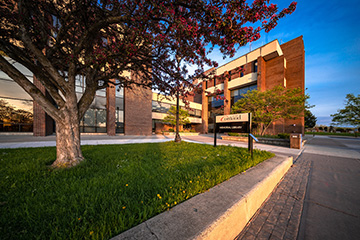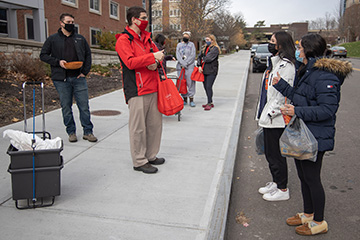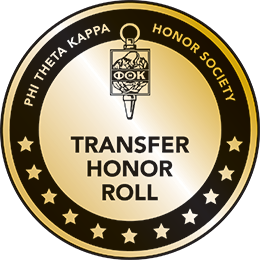
03/09/2021
SUNY Cortland’s reputation for helping transfer students held strong during the COVID-19 pandemic.
The university recently was recognized for the fourth consecutive year on the Transfer Honor Roll published by Phi Theta Kappa, an international honor society that welcomes high-achieving students from two-year colleges.
The 2021 list highlighted 153 colleges and universities nationwide, including four from the SUNY system. Cortland is New York’s only public institution to be honored every year since 2018.
“The past year has proven the resilience of our transfer students,” said Greg Diller ’07, SUNY Cortland’s coordinator of transition programs as well as the organizer of its honor roll application. “Transfer students are still doing well, even during these pandemic times.”
The university received 2,350 transfer applications in 2020, with 745 students enrolling. Despite the challenges posed by the pandemic, Cortland’s transfer students demonstrated an impressive commitment to their studies, Diller said.
 |
| Greg Diller ’07, center, speaks with students during the Fall 2021 semester. Staff members from Advisement and Transition handed out goodie bags and answered questions about registering for classes for the Spring 2021 semester. |
Thirty undergraduates earned an annual merit scholarship worth $1,000 from Phi Theta Kappa in 2020 — a record number for the institution. Nearly 200 transfer students were invited to join SUNY Cortland’s chapter of the Tau Sigma National Honor Society, an increase from 143 students in 2019. To be eligible for Tau Sigma, transfer students must earn a 3.5 grade point average while completing at least 12 credit hours.
“It’s great to see our students are doing exceptional work even if they don’t end up joining one of these groups,” Diller said.
Most transfer-specific programs and activities shifted online during the past year, Diller said. That included everything from Orientation and academic advising to Welcome Week events and award ceremonies.
“Like everything, it’s a different scale virtually,” he said. “But we wanted to keep our efforts going online as best as we could so that when we do get back to normal, we’re continuing rather than starting new.”
In order to be named to the honor roll, campus representatives completed a profile using an online tool called PTK Connect. Institutions then were assigned a transfer friendliness rating based on qualities such as transfer student support services, financial aid, admissions outreach and campus opportunities. The top 25% of highest-rated campuses were recognized.
SUNY Cortland’s application continues to highlight several key areas:
- Advisement and Transition: Housed on the first floor of Memorial Library, this 12-person team helps meet the academic advising needs of all students, especially transfers. Several staff members specialize in transfer credit evaluation. Zachary Wilson, transfer mobility advisor, also works closely with nearby partners in SUNY Broome and Tompkins Cortland Community College.
- Transfer Planning Sheets and Transfer Equivalency Charts: These online tools help students map a clear path to SUNY Cortland. Planning sheets outline recommended coursework prior to transferring and equivalency charts show how coursework from various institutions will count at Cortland.
- Transfer Network Team: This group looks to connect new students with classmates who previously transferred to SUNY Cortland. Regular meetings took place on Webex during the pandemic. “They’re still going strong,” Diller said. “Students are always personable and there to answer anything.”
- Orientation: In addition to several other new student programs, individual advising between faculty members and transfer students occurred online during the most recent summer and winter sessions. “I think that one-on-one face time really helped, especially for transfer students easing with their transition,” Diller said.
- COR 201: Modeled after COR 101 for first-year students, this one-credit course introduces new transfer students to academic life and the many ways to create a successful Cortland experience.
- Reverse transfer degrees: Transfer students who come from community colleges without completing their associate’s degree can still earn it while working toward their bachelor’s degree at SUNY Cortland. This opportunity is particularly useful for students pursuing part-time work during college that requires an associate’s degree.
 |
| Phi Theta Kappa’s Transfer Honor Roll included four SUNY institutions in 2021. |
Diller expressed an eagerness to organize more transfer-specific events outdoors during the spring semester as the weather improves and safety guidelines allow. He also pointed to lessons learned and improvements made during the pandemic, specifically as they relate to online availability for students.
“In Advisement and Transition, I think we’re more accessible than ever for students and we’ll likely keep some virtual hours after we’re through the pandemic,” he said. “We all want to get back to in-person events because we get that enjoyment out of them, but hopefully we can continue to meet students where they need us.”
Prospective transfer students can contact the Admissions Office for more information about the application process or Advisement and Transition for more information about resources for support.
Visit the Phi Theta Kappa website for more information on SUNY Cortland’s recent recognition, including a full list of all 2021 Transfer Honor Roll members.